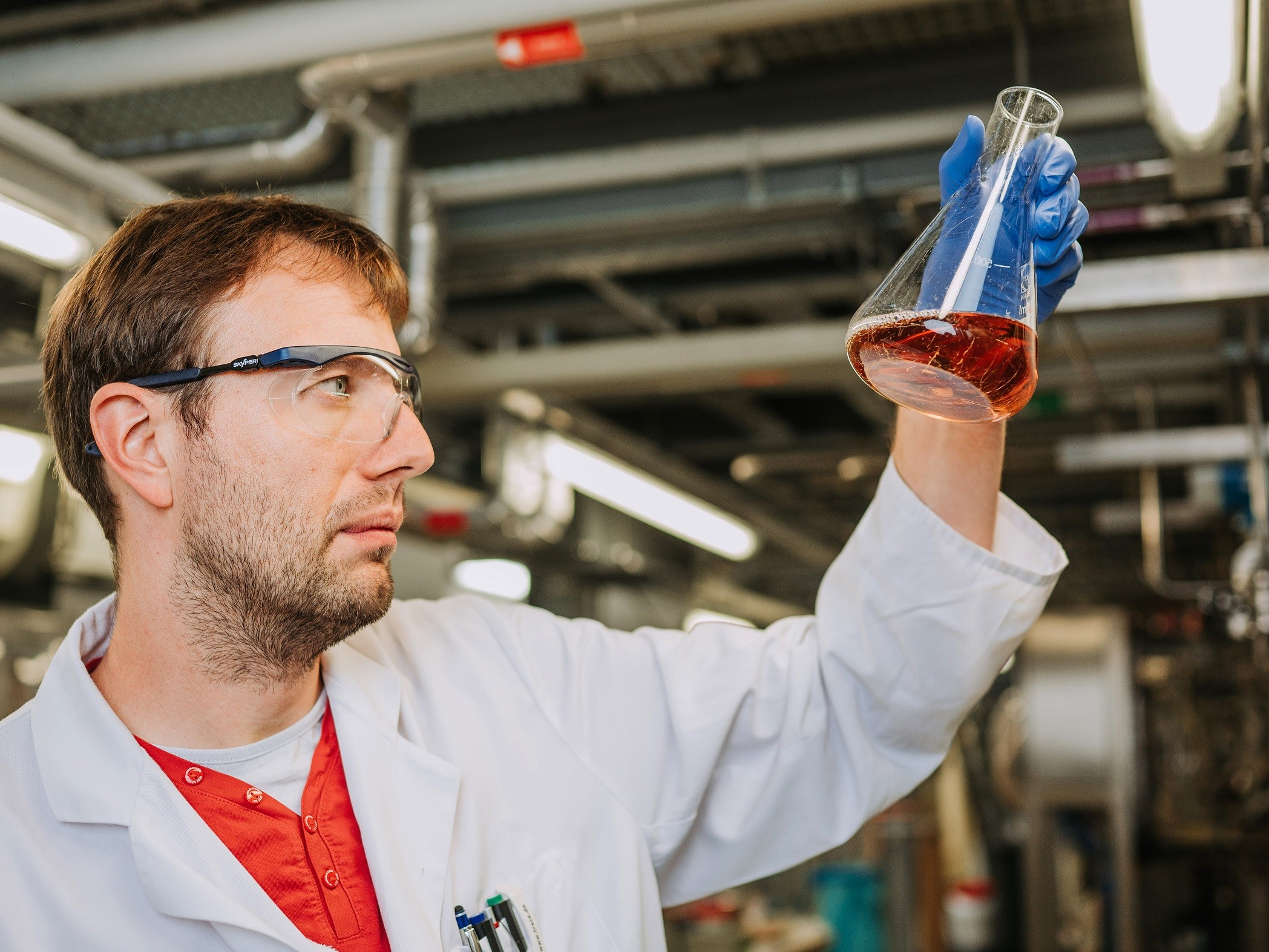ATB - Innovative plastics made from organic waste

At the Leibniz Institute for Agricultural Engineering and Bioeconomy (ATB) in Potsdam, research is being conducted into new raw materials for sustainable plastics. In a new process, lactic acid fermentation from biogenic waste from the agricultural and food industry and from biogas plants is being used for this purpose.
It is impossible to imagine today’s western world without plastics, and they can still be found in almost all areas of life. However, the chemical building blocks for these plastic products are still produced almost exclusively on the basis of the finite resource petroleum. Biobased chemicals are therefore an essential contributor to a future sustainable economy (bio economy). In view of growing mountains of plastic waste, environmental damage and climate change, the environmentally harmful fossil raw materials used up to now are to be increasingly replaced. Renewable raw materials that do not compete with food or animal feed production are particularly interesting.
At the Leibniz Institute for Agricultural Engineering and Bioeconomy (ATB), a new raw material for bioplastics made from ‘polymerisable acid from alternative sugars’ is being researched in the pilot plant funded by the ERDF.
Basic substances for the bioplastics of tomorrow
In this innovative process, biogenic waste, such as maize fermentation residue from biogas plants or rye straw, is the feedstock for the new sustainable bioplastics. In a multi-stage fermentation process, lactic acid is formed and further processed into polylactic acid (PLA), which is the basic substance for bioplastics. In this process, starch (glucose) is extracted from biowaste and plant residues, enzymes are then added to the starch to convert it into glucose (dextrose), which is subsequently fermented into lactic acid by microorganisms. The subsequent polymerisation of the lactic acid into PLA produces long-linked molecular chains with properties similar to petroleum-based polymers, i.e., conventional plastic.
Potential for the regional circular economy
If this technology catches on, it could lead to the establishment of biorefineries in rural areas. These biorefineries can be operated without any sophisticated infrastructure and they can always source their raw material regionally. Using domestic resources also strengthens local production and marketing and keeps added value in the region. By creating jobs, it is precisely those structurally weaker parts of Brandenburg that could benefit from sustainable development in the future. When using fermentation residues from biogas plants, the maize feedstock can also be used to produce biogas and as the basis for sustainable plastics. The project, funded by the European Regional Development Fund (ERDF), is therefore an important part of a holistic circular economy strategy.
For further information, visit www.atb-potsdam.de
It is impossible to imagine today’s western world without plastics, and they can still be found in almost all areas of life. However, the chemical building blocks for these plastic products are still produced almost exclusively on the basis of the finite resource petroleum. Biobased chemicals are therefore an essential contributor to a future sustainable economy (bio economy). In view of growing mountains of plastic waste, environmental damage and climate change, the environmentally harmful fossil raw materials used up to now are to be increasingly replaced. Renewable raw materials that do not compete with food or animal feed production are particularly interesting.
At the Leibniz Institute for Agricultural Engineering and Bioeconomy (ATB), a new raw material for bioplastics made from ‘polymerisable acid from alternative sugars’ is being researched in the pilot plant funded by the ERDF.
Basic substances for the bioplastics of tomorrow
In this innovative process, biogenic waste, such as maize fermentation residue from biogas plants or rye straw, is the feedstock for the new sustainable bioplastics. In a multi-stage fermentation process, lactic acid is formed and further processed into polylactic acid (PLA), which is the basic substance for bioplastics. In this process, starch (glucose) is extracted from biowaste and plant residues, enzymes are then added to the starch to convert it into glucose (dextrose), which is subsequently fermented into lactic acid by microorganisms. The subsequent polymerisation of the lactic acid into PLA produces long-linked molecular chains with properties similar to petroleum-based polymers, i.e., conventional plastic.
Potential for the regional circular economy
If this technology catches on, it could lead to the establishment of biorefineries in rural areas. These biorefineries can be operated without any sophisticated infrastructure and they can always source their raw material regionally. Using domestic resources also strengthens local production and marketing and keeps added value in the region. By creating jobs, it is precisely those structurally weaker parts of Brandenburg that could benefit from sustainable development in the future. When using fermentation residues from biogas plants, the maize feedstock can also be used to produce biogas and as the basis for sustainable plastics. The project, funded by the European Regional Development Fund (ERDF), is therefore an important part of a holistic circular economy strategy.
For further information, visit www.atb-potsdam.de

